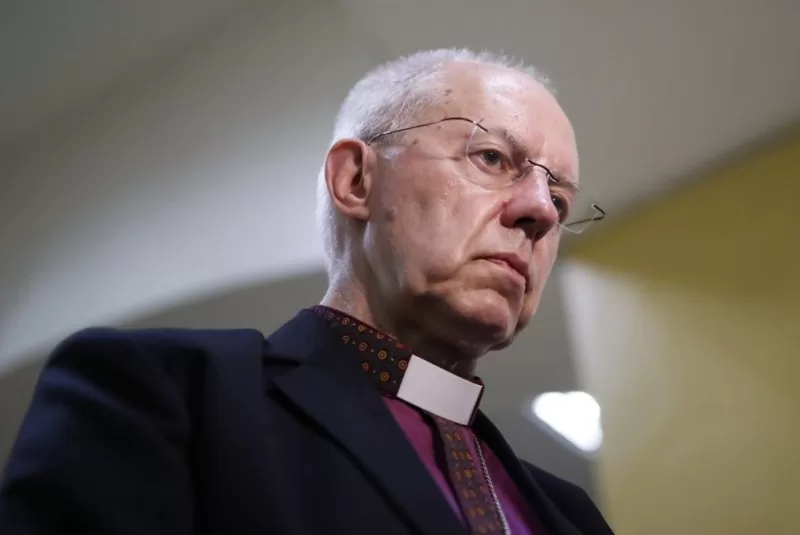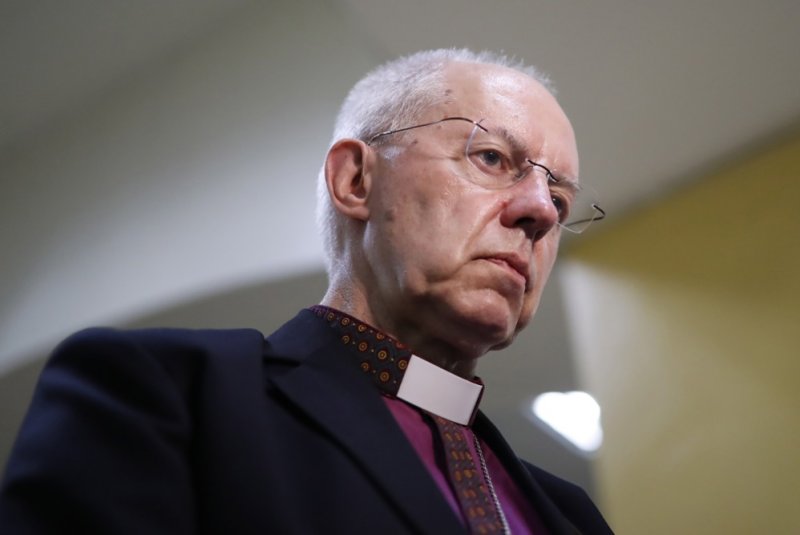Justin Welby resigned as the archbishop of Canterbury on Tuesday amid a critical report over his handling of an abuse scandal. Photo provided by Rodrigo Sura/EPA-EFE
Nov. 12 (UPI) — Archbishop of Canterbury Justin Welby on Tuesday resigned as head of the Church of England after a critical report over his handling of an abuse scandal.
“Having sought the gracious permission of His Majesty The King, I have decided to resign as Archbishop of Canterbury,” Welby wrote in a letter explaining his departure.
Pressure had been mounting for Welby to step aside following a damning publication last week which outlined the Church of England’s role in the alleged cover-up of abuse of young boys at the hands of the now-dead John Smyth in the 1970s and 1980s and then later allegedly in South Africa and neighboring Zimbabwe.
It’s alleged there could be up to 130 victims.
A news report, wrote Welby, “has exposed the long-maintained conspiracy of silence about the heinous abuses of John Smyth.”
The Makin Review, an independent publication, concluded that Smyth might have been brought to justice long ago had the archbishop sooner contacted police 10 years ago.
“When I was informed in 2013 and told that police had been notified, I believed wrongly that an appropriate resolution would follow,” Welby claimed.
It is “very clear,” he added, that “I must take personal and institutional responsibility for the long and retraumatizing period between 2013 and 2024.”
“With sadness, I fully respect and understand Archbishop Justin’s decision today to resign,” Dr. Joanne Grenfell, the Bishop of Stepney and lead safeguarding bishop of the Church of England, told the BBC. Grenfell says its “now necessary for others to take up the baton.”
Exactly when Welby, 68, intends to step-down from his role has yet to be announced. The “exact timing,” he wrote in his letter, will be decided “once a review of necessary obligations has been completed, including those in England and in the Anglican Communion.”
According to Grenfell, Welby’s choice “does not absolve any of us from bringing about the wholesale changes in culture and leadership that are essential in every part of the Church,” she added.
The Makin report outlined how Smyth — an unordained church barrister and lay preacher — ran summer camps and singled out dozens of younger boys there and at Winchester College before he would beat them with a cane in his shed after taking them to his home in what Keith Makin contends was a “clearly sexually motivated, sadistic regime.”
Smyth relocated to Africa in the 1980s where it’s alleged a further 85 to 100 other “young male children aged 13 to 17” suffered abuse at the hands of Smyth.
But he died in 2018 in Cape Town, South Africa at age 75 while under investigation by Hampshire authorities but was “never brought to justice for the abuse”, Makin wrote last week
Makin claims Smyth “could and should” have been been reported to authorities by Welby and the church “missed opportunity to bring him to justice.”
Welby, according to the Makin Review article, “may not have known of the extreme seriousness of the abuse,” it said, but “it is most probable that he would have had at least a level of knowledge that John Smyth was of some concern,” it said, adding “it is not possible to establish whether Welby knew of the severity of the abuses in the U.K. prior to 2013.”
On Monday, Helen-Ann Hartley, the Bishop of Newcastle, said Welby’s position had become “untenable” after the report prior to his announced resignation.
“I hope this decision makes clear how seriously the Church of England understands the need for change and our profound commitment to creating a safer church,” Welby wrote Tuesday in part of his letter. “As I step down I do so in sorrow with all victims and survivors of abuse.”
Hartley, meanwhile, said “it’s very hard” for the Church of England “to continue to have a moral voice in any way, shape or form in our nation, when we cannot get our own house in order with regard to something as critically important [as abuse],” she said.
“I think rightly people are asking the question: ‘Can we really trust the Church of England to keep us safe?’ And I think the answer at the moment is ‘no’,” Hartley added.

